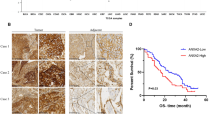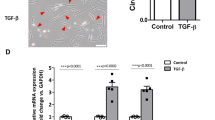Abstract
Epithelial–mesenchymal transition (EMT) has a crucial role during embryonic development and has also come under intense scrutiny as a mechanism through which esophageal squamous cell cancer (ESCC) progresses to become metastatic. Transforming growth factor beta (TGF-β)-mediated EMT has been observed in a variety of cell types and has been identified as the main inducer of EMT in many types of cancer. Akt activity is involved in TGF-β-mediated EMT; however, its precise relationship and role in EMT in ESCC has not been well explained to date. Our data demonstrated that in human ESCC tissues Akt and its activated form, phosphorylated-Akt (p-Akt), were overexpressed; in addition, Akt and p-Akt were negatively correlated with epithelial cadherin (E-cadherin). In EC-9706 cells, exogenous TGF-β1 could induce EMT and at the same time could increase the EC-9706 cell invasive and metastatic ability. Moreover, Akt knockdown by small-interfering RNA could attenuate the EMT induced by TGF-β1 by increasing the epithelial marker E-cadherin and decreasing the mesenchymal marker Vimentin. Silencing Akt expression could decrease the migration ability of EC-9706 cells efficiently. In short, Akt is likely to have a more important role in the EMT induced by TGF-β1 in EC-9706 and may contribute to the invasive and metastatic ability of EC-9706. Akt may be an effective therapeutic in advanced and metastatic ESCC.
This is a preview of subscription content, access via your institution
Access options
Subscribe to this journal
Receive 12 print issues and online access
$259.00 per year
only $21.58 per issue
Buy this article
- Purchase on Springer Link
- Instant access to full article PDF
Prices may be subject to local taxes which are calculated during checkout





Similar content being viewed by others
References
Li LD, Lu FZ . Survey on the death of malignant tumors in China. Chin Can 1996; 5: 3–7.
Gos M, Miloszewska J, Przybyszewska M . Epithelial-mesenchymal transition in cancer progression. Postepy Biochem 2009; 55: 121–128.
Bhangu A, Wood G, Mirnezami A, Darzi A, Tekkis P, Goldin R . Epithelial mesenchymal transition in colorectal cancer: seminal role in promoting disease progression and resistance to neoadjuvant therapy. Surg Oncol 2012; 21: 316–323.
Jordan NV, Johnson GL, Abell AN . Tracking the intermediate stages of epithelial-mesenchymal transition in epithelial stem cells and cancer. Cell Cycle 2011; 10: 2865–2873.
Takahashi K, Miyashita M, Makino H, Akagi I, Orita H, Hagiwara N et al. Expression of Akt and Mdm2 in human esophageal squamous cell carcinoma. Exp Mol Pathol 2009; 87: 42–47.
Lamouille S, Derynck R . Emergence of the phosphoinositide 3-kinase-Akt-mammalian target of rapamycin axis in transforming growth factor-β-induced epithelial-mesenchymal transition. Cells Tissues Organs 2011; 193: 8–22.
Crowell James A, Steele Vernon E, Fay Judith R . Targeting the AKT protein kinase for cancer chemoprevention. Mol Cancer Ther 2007; 6: 2139–2148.
Heldin CH, Vanlandewijck M, Moustakas A . Regulation of EMT by TGFβ in cancer. FEBS Lett 2012; 586: 1959–1970.
Soond SM, Chantry A . How ubiquitination regulates the TGF-β signalling pathway: new insights and new players: new isoforms of ubiquitin-activating enzymes in the E1-E3 families join the game. Bioessays 2011; 33: 749–758.
Tang WB, Ling GH, Sun L, Liu FY . Smad anchor for receptor activation (SARA) in TGF-beta signaling. Front Biosci (Elite Ed) 2010; 2: 857–860.
Shiota M, Zardan A, Takeuchi A, Kumano M, Beraldi E, Naito S et al. Clusterin mediates TGF-β-induced epithelial-mesenchymal transition and metastasis via Twist1 in prostate cancer cells. Cancer Res 2012; 72: 5261–5672.
Zhang J, Liang Q, Lei Y, Yao M, Li L, Gao X et al. SOX4 induces epithelial-mesenchymal transition and contributes to breast cancer progression. Cancer Res 2012; 72: 4597–4608.
Ha B, Kim EK, Kim JH, Lee HN, Lee KO, Lee SY et al. Human peroxiredoxin 1 modulates TGF-β1-induced epithelial-mesenchymal transition through its peroxidase activity. Biochem Biophys Res Commun 2012; 421: 33–37.
Rodriguez FJ, Lewis-Tuffin LJ, Anastasiadis PZ . E-cadherin's dark side: possible role in tumor progression. Biochim Biophys Acta 2012; 1826: 23–31.
Lee MY, Shen MR . Epithelial-mesenchymal transition in cervical carcinoma. Am J Transl Res 2012; 4: 1–13.
Yamamoto H, Mukaisho K, Sugihara H, Hattori T, Asano S . Down-regulation of FXYD3 is induced by transforming growth factor-β signaling via ZEB1/δEF1 in human mammary epithelial cells. Biol Pharm Bull 2011; 34: 324–329.
Slabáková E, Pernicová Z, Slavíčková E, Staršíchová A, Kozubík A, Souček K et al. TGF-β1-induced EMT of non-transformed prostate hyperplasia cells is characterized by early induction of SNAI2/Slug. Prostate 2011; 71: 1332–1343.
Pignatelli J, Tumbarello DA, Schmidt RP, Turner CE . Hic-5 promotes invadopodia formation and invasion during TGF-β-induced epithelial-mesenchymal transition. J Cell Biol 2012; 197: 421–437.
Netherton SJ, Bonni S . Suppression of TGFβ-induced epithelial-mesenchymal transition like phenotype by a PIAS1 regulated sumoylation pathway in NMuMG epithelial cells. PLoS One 2010; 5: e13971.
Räsänen K, Vaheri A . TGF-beta1 causes epithelial-mesenchymal transition in HaCaT derivatives, but induces expression of COX-2 and migration only in benign, not in malignant keratinocytes. J Dermatol Sci 2010; 58: 97–104.
Ogunwobi OO, Wang T, Zhang L, Liu C . Cyclooxygenase-2 and Akt mediate multiple growth-factor-induced epithelial-mesenchymal transition in human hepatocellular carcinoma. J Gastroenterol Hepatol 2012; 27: 566–578.
Krantz SB, Shields MA, Dangi-Garimella S, Munshi HG, Bentrem DJ . Contribution of epithelial-to-mesenchymal transition and cancer stem cells to pancreatic cancer progression. J Surg Res 2012; 173: 105–112.
Sun YC, Liang Q, Qian KL, Xiao L, Liu Q, Shi XF . Effect of TGF-b1 siRNA-mediated silencing on Smad proteins in hepatic fibrosis rats. Zhonghua Gan Zang Bing Za Zhi 2012; 20: 289–293.
Rees JR, Onwuegbusi BA, Save VE, Alderson D, Fitzgerald RC . In vivo and in vitro evidence for transforming growth factor-beta1-mediated epithelial to mesenchmal transition in esophageal adenocarcinoma. Cancer Res 2006; 66: 9583–9590.
Hao J, Liu S, Zhao S, Liu Q, Lv X, Chen H et al. PI3K/Akt pathway mediates high glucose-induced lipogenesis and extracellular matrix accumulation in HKC cells through regulation of SREBP-1 and TGF-β1. Histochem Cell Biol 2011; 135: 173–181.
Maseki S, Ijichi K, Tanaka H, Fujii M, Hasegawa Y, Ogawa T et al. Acquisition of EMT phenotype in the gefitinib-resistant cells of a head and neck squamous cell carcinoma cell line through Akt/GSK-3β/snail signalling pathway. Br J Cancer 2012; 106: 1196–1204.
Acknowledgements
This work was supported by the National Natural Science Foundation of China [grant number 81071970] and the Medical Science and Technology Program of He’nan Province [grant number 200801006].
Author information
Authors and Affiliations
Corresponding author
Ethics declarations
Competing interests
The authors declare no conflict of interest.
Rights and permissions
About this article
Cite this article
Xuan, X., Zeng, Q., Li, Y. et al. Akt-mediated transforming growth factor-β1-induced epithelial–mesenchymal transition in cultured human esophageal squamous cancer cells. Cancer Gene Ther 21, 238–245 (2014). https://doi.org/10.1038/cgt.2014.23
Received:
Accepted:
Published:
Issue Date:
DOI: https://doi.org/10.1038/cgt.2014.23



